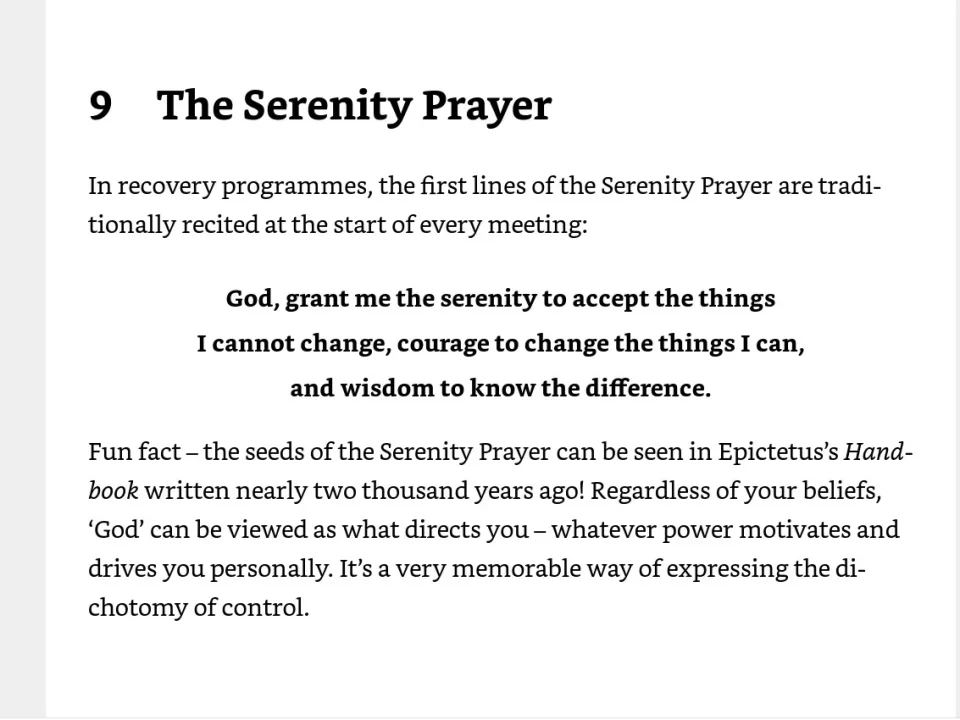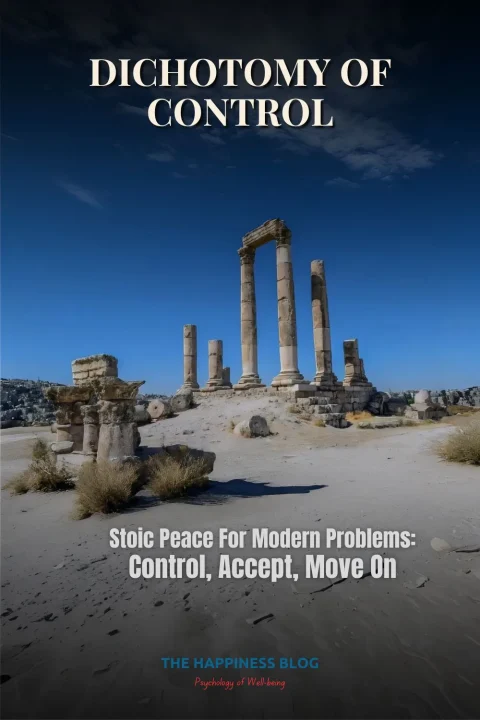Today's Friday • 8 mins read
The Stoics use the principle of dichotomy of control to live a stress-free modern life. You can too. It is simple to understand and apply.
Say, you’re stuck in traffic. Your flight is boarding in two hours. Your heart is racing. You’re fuming at the traffic chaos, at the drivers, at the universe.
Then it hits you: you can’t control the traffic.
This realization, understanding what you can and cannot control, sits at the heart of Stoic philosophy. For over 2,000 years, it’s helped people stay calm when chaos erupts. Today, it works just as well.
Origin of Stoicism
Around 300 BCE, Zeno of Citium founded Stoicism as a philosophical school in a marketplace in Athens.
By the 1st century BCE, Stoicism had entered Roman elite circles and become a way of life for royalty and politics, influencing Emperors Augustus, Hadrian, and Marcus Aurelius.
Then, in 529 CE, the Byzantine emperor Justinian I ordered all Stoic academies to close down as he saw them as a threat to Christianity.
Yet Stoic ideas survived and resurfaced across centuries.
Today, Stoicism remains relevant, perhaps more so than ever. The inner struggles that Marcus Aurelius solved with Stoicism while ruling the world still map onto our modern problems.
Stoicism doesn’t ask you to change your religion, abandon modern comforts, or reject your worldview; it asks only that you practice its core principles.
Its teachings are timeless and universal, like the dichotomy of control, a central Stoic pillar.
What Is the Dichotomy of Control?
The dichotomy of control is simple in theory but transformative in practice. It divides everything in life into two categories: what you control and what you don’t.
What you control:
- Your thoughts and judgments
- Your desires and aversions
- Your actions and reactions
- Your effort and intentions
What you don’t control:
- Other people’s opinions
- Your body and health
- Your possessions
- Your reputation
- External events
The boundary matters. Most of our stress comes from trying to control things we can’t. We obsess over what others think. We worry about outcomes we can’t guarantee. We rage against situations we can’t change.

Epictetus, a Stoic teacher who lived as a slave, explained this clearly:
“Some things are within our power, while others are not. Within our power are opinion, motivation, desire, aversion, and in a word, whatever is of our own doing; not within our power are our body, our property, reputation, office, and, in a word, whatever is not of our own doing. If you regard only that which is your own as being your own (as is indeed the case), no one will ever be able to coerce you, no one will hinder you, you’ll find fault with no one, you’ll accuse no one, you’ll do nothing whatever against your will, you’ll have no enemy, and no one will ever harm you because no harm can affect you.”
The promise is radical: if you stop trying to control what you can’t control, no one and nothing can truly harm you.
What This Means in Practice
Let’s say you’re interviewing for a job you really want. You prepare meticulously. You research the company. You practice your answers. You show up early.
Then you walk into the room.
At this point, what can you control? Your effort in the interview. Your answers. Your tone. Your body language. Your honesty.
What can’t you control? The interviewer’s mood. The other candidates. Whether they need someone with different skills. Whether they’ve already decided to promote an internal candidate. The economy. A thousand other variables.
A non-Stoic approach: You agonize over the interviewer’s facial expressions. You second-guess your answers. You obsess about whether you got the job. Days pass. You’re miserable.
A Stoic approach: You do your best during the interview. You stay present. When it’s over, you let it go. You move on. You made the effort. The rest isn’t yours to control.
Notice the difference? The second approach produces less suffering and, ironically, often better results. When you’re not tangled in anxiety, you think more clearly.
Dichotomy of Control in Your Relationships
This principle transforms how you relate to others.
In relationships built on Stoic thinking, you stop trying to force someone to love you, respect you, or change. Instead, you control your own kindness, honesty, and integrity. You choose how to respond to their behavior.
You can’t control whether your partner stays. You can control whether you treat them well while they’re here.
You can’t control whether your friend forgives you. You can control whether you apologize sincerely.
You can’t control whether your parent accepts you. You can control your own boundaries and self-respect.
This shift from control to responsibility creates healthier relationships. You stop blaming others for your unhappiness. You stop waiting for them to change before you feel better. You take back your power.
The Serenity Prayer Connection
The dichotomy of control was so powerful that it shaped one of modern history’s most influential prayers. It became the Serenity Prayer, which later became central to Alcoholics Anonymous and many other 12-step programs:

Understanding Preferred and Dispreferred Indifferents
The Stoics went deeper with this idea. They recognized that things outside your control can still be good or bad; they just shouldn’t determine your happiness.
- Preferred indifferents: Things we naturally want but can’t guarantee. Like health, wealth, a good reputation, a long life.
- Dispreferred indifferents: Things we naturally want to avoid). Like illness, poverty, criticism, passing away.
The key insight: these things are “indifferent” to your virtue and character. You can live with integrity whether you’re rich or poor, healthy or sick, praised or criticized.
What matters is how you respond to these circumstances. A virtuous person facing poverty remains virtuous. A vicious person with wealth remains vicious.
Your character, what you can control, is what defines your life, not your circumstances.
How Epictetus Sums It Up
Epictetus offered one final thought that captures the whole idea:
“The chief task in life is simply this: to identify and separate matters so that I can say clearly to myself which are externals not under my control, and which have to do with the choices I actually control.”
This is the work. Not profound or mysterious work—just clear thinking about what’s yours to control and what isn’t.
Some things are within our power, while others are not. Within our power are opinion, motivation, desire, aversion, and in a word, whatever is of our own doing; not within our power are our body, our property, reputation, office, and, in a word, whatever is not of our own doing… If you regard that only that which is your own as being your own (as is indeed the case), no one will ever be able to coerce you, no one will hinder you, you’ll find fault with no one, you’ll accuse no one, you’ll do nothing whatever against your will, you’ll have no enemy, and no one will ever harm you because no harm can affect you.
— Epictetus, Enchiridion, 1.1
Applying This Today
For 2025, the dichotomy of control matters more than ever. We live in an age of obsessive comparison, viral outrage, and supposed control. We scroll endlessly, comparing our lives to others. We rage at news we can’t change. We stress about opinions we can’t influence.
The Stoic answer: Stop.
Identify what you control:
- Your daily habits and choices
- How you spend your time and attention
- Your effort and preparation
- Your response to difficulty
- Your integrity
Let go of what you don’t:
- Other people’s thoughts and judgments
- Outcomes you’ve already done your best on
- The past and what already happened
- Global events beyond your influence
- Other people’s choices and reactions
As philosopher Massimo Pigliucci explains:
“Apply the dichotomy of control and the four virtues to everything you do and, as Epictetus promises, you will never be unhappy. You will be free, and you will live a life truly worth living.”
Final Words
The dichotomy of control isn’t about accepting defeat or becoming passive. It’s about directing your energy where it actually matters.
Stop wasting effort on things you can’t change. Start investing in things you can: your character, your effort, your choices, your growth.
When you do this, something shifts. You stop blaming others. You stop feeling victimized. You stop seeking external validation. You become responsible for your own peace.
That’s the real power of Stoicism. Not pretending that nothing bothers you. Not becoming emotionally numb. But understanding exactly where your real power lies—and using it wisely.
The Stoics knew what modern psychology has now confirmed: the ability to distinguish between what you control and what you don’t is one of the strongest predictors of mental health and life satisfaction.
So the next time you’re stuck in traffic, or waiting for news, or worrying about what someone thinks of you, remember: that’s not yours to control.
Focus on your response, your effort, and your peace. That’s enough, and that is all you need.
• • •
√ Also Read: 7 Secrets Why Stoics Are Happier Than You Think
√ Please share this with someone.
» You deserve happiness! Choosing therapy could be your best decision.
...
• Disclosure: Buying via our links earns us a small commission.
